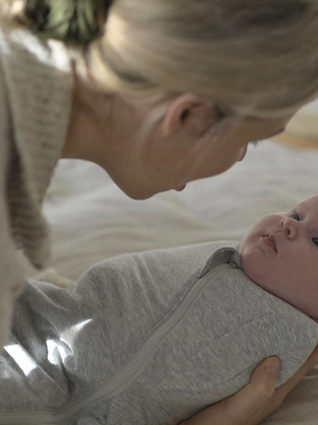
- Home
- Tools And Resources
- Baby Development Calendar
- 7–8 Weeks Old Baby | Milestones
7-8-weeks-old baby
2 min
Babies at this age…
- Will smile at you - and everybody else, too!
- May respond with little noises - oohs and aaahs - when being talked to
- Will gurgle and coo, and might even chuckle
- May be able to hold their heads up for a little while
- Will turn toward sounds and watch moving objects
- Enjoy playing peek-a-boo
- Start to open their hands more often, instead of keeping them in a fist most of the time
Your baby’s milestones
Babies develop from the head down. This means the neck muscles are one of the first areas to develop, and you will notice your baby is becoming much more capable when it comes to holding his or her head steady.
All babies are different, so try not to worry if your baby seems to be lagging a bit behind other babies (or boast if yours is ahead!). They all develop at their own pace.
The age at which babies reach developmental milestones may vary, but the order of the milestones is usually the same.
Your baby’s milestones
Babies develop from the head down. This means the neck muscles are one of the first areas to develop, and you will notice your baby is becoming much more capable when it comes to holding his or her head steady.
All babies are different, so try not to worry if your baby seems to be lagging a bit behind other babies (or boast if yours is ahead!). They all develop at their own pace.
The age at which babies reach developmental milestones may vary, but the order of the milestones is usually the same.
Immunisations
Your baby may still seem too little for this, but the first round of immunisations comes at around 8 weeks! At this visit, your baby will get a 5-in-one vaccine known as DTaP/IPV/Hib, which protects against diphtheria, tetanus, pertussis (whooping cough), polio and Hib (an infection that can cause severe pneumonia or meningitis). Your baby will also be given a vaccination to protect against pneumococcal infection. For more information about each of these vaccines, you can visit the NHS vaccination planner.
Most babies find vaccinations a little unpleasant, and it’s common for them to be unsettled for up to 48 hours after the visit. They may also develop a mild fever or a small lump at the injection site. Your GP, health visitor or other health professional can give you advice on how to keep your baby as comfortable as possible.
Taking a moment for yourself
Every parent is different – some can happily leave the housework for another day, while others find it hard to relax unless things feel tidy. Try to focus on what really matters to you right now, and let the rest wait if you can. Taking time out for yourself – even something as simple as popping out for a haircut while your partner or family member watches the baby – can be far more beneficial than ticking off chores.
And if you've noticed more hair coming out than usual, don’t worry – it’s completely normal. During pregnancy, higher hormone levels help keep hair in the growing phase for longer. After birth, those levels start to rebalance, and the hair you held onto during pregnancy begins to shed. It’s just your body returning to its usual cycle.
